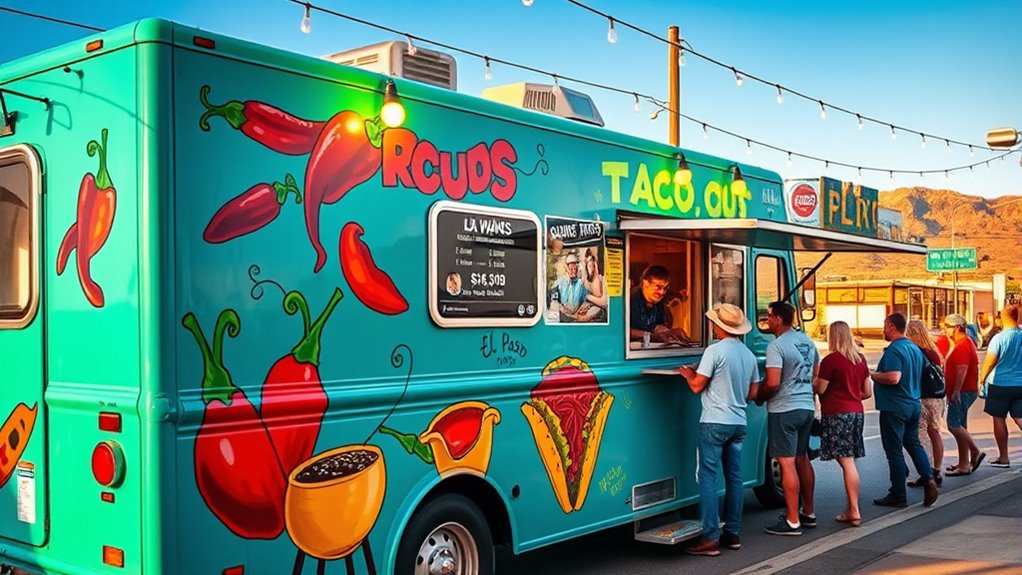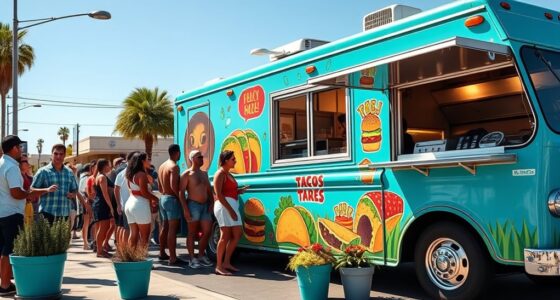To start a food truck in El Paso, TX, you’ll need to understand the local food scene and develop a strong brand that reflects community flavors. You must navigate permits, zoning rules, and health regulations while budgeting for truck purchases and equipment. Craft a menu featuring regional ingredients and use technology for efficient operations. Participating in local events boosts your visibility. Keep building your strategy, and you’ll discover more tips to make your food truck a success.
Key Takeaways
- Research El Paso’s local food scene, regulations, and zoning laws to ensure compliance and effective branding.
- Obtain necessary permits, licenses, and health inspections through El Paso’s official online portals.
- Secure funding via SBA loans, and acquire insurance to protect your food truck business.
- Choose a suitable food truck and equipment, considering condition, fuel efficiency, and menu needs.
- Develop a diverse, locally inspired menu and implement marketing strategies to attract customers and participate in community events.
Starting With Local Food Scene
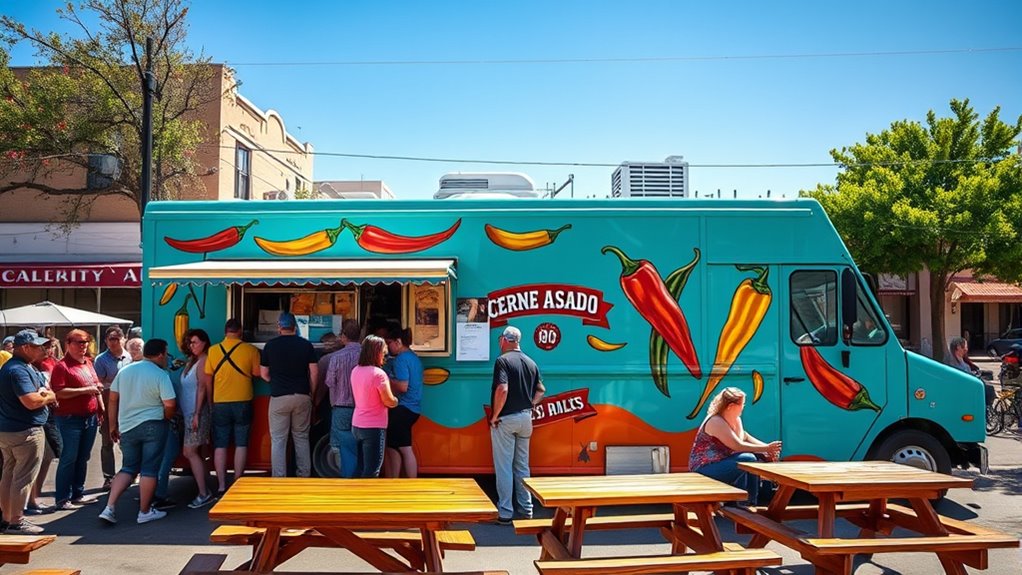
El Paso’s vibrant food scene provides an ideal foundation for exploring its growing food truck culture. To stand out, focus on strong food truck branding that reflects local flavors and community spirit. Your branding helps attract attention and creates a memorable identity that resonates with locals. Building customer loyalty is essential; by offering consistent quality, engaging with customers, and embracing local traditions, you establish trust and repeat business. Tap into the diverse tastes of El Paso’s residents, from authentic Mexican cuisine to fusion dishes, to create a unique menu that appeals to the community. Incorporating diverse designs in your food truck’s appearance can further enhance its visual appeal and attract a wider customer base. When your branding aligns with local culture and your service fosters loyalty, your food truck can become a staple in the city’s lively culinary scene.
Understanding Local Requirements
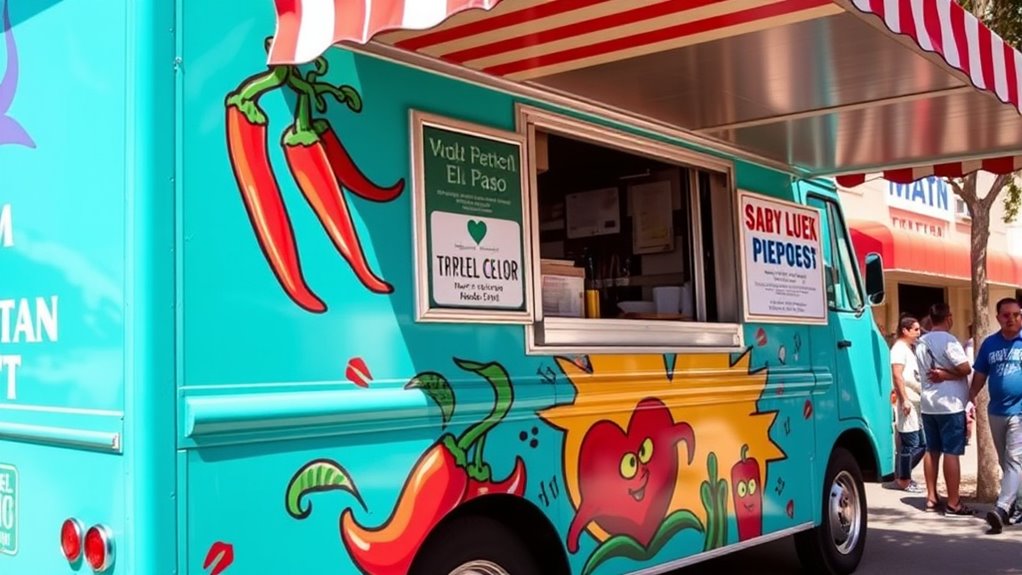
To get your food truck up and running in El Paso, you need to understand the local requirements, starting with the online permit application process. You’ll also need to follow sanitation protocols and gather the necessary documentation to stay compliant. Don’t forget to learn about designated food truck zones to make certain you park and operate legally in the city. Additionally, being aware of privacy and cookie policies can help you better understand how local regulations may impact your online presence and customer interactions.
Online Permit Application Process
Navigating the online permit application process can seem daunting, but understanding local requirements makes it manageable. To start, review El Paso’s specific online permit portal and ensure your device has a stable internet connection. Next, gather all necessary documents, such as proof of business registration and insurance. Then, follow these steps:
- Create an account on the official city website.
- Complete the online application form accurately.
- Upload required documentation.
- Pay the application fee securely through the portal.
Once submitted, monitor your email for updates or requests for additional information. Staying organized and attentive to details will streamline your online permit application process, getting you closer to launching your food truck in El Paso without unnecessary delays.
Sanitation Protocols and Documentation
After completing your online permit application, it’s important to familiarize yourself with El Paso’s sanitation protocols and required documentation. Food safety is a top priority, and local regulations are designed to prevent contamination and ensure public health. You’ll need to maintain proper sanitation documentation, including records of cleaning schedules, pest control, and employee health certifications. El Paso’s health department may require periodic inspections to verify compliance with food safety standards. Make sure your food truck’s setup meets all sanitation requirements, such as safe water supply, proper waste disposal, and sanitized equipment. Staying organized with your sanitation documentation not only helps you pass inspections but also demonstrates your commitment to food safety, which builds trust with your customers.
Designated Food Truck Zones
Understanding the designated food truck zones in El Paso is essential for legal operation and customer accessibility. These zones dictate where you can park and serve, impacting your food truck branding and menu customization options. To stay compliant, familiarize yourself with local regulations and approved areas.
Here are four key points to consider:
- Confirm zone boundaries and restricted parking times.
- Obtain necessary permits for each designated zone.
- Ensure your menu and branding align with zone-specific rules.
- Be aware of special event zones that may require additional permissions.
Setting Up Your Base of Operations
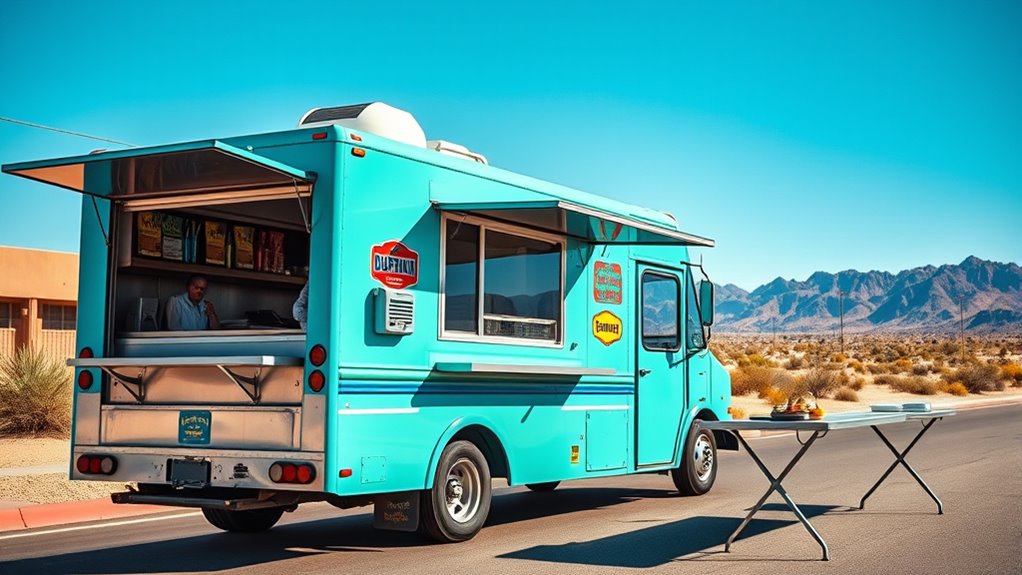
Choosing the right setup for your food truck starts with understanding shared kitchen licensing options, which can save you time and money. Next, you’ll need to select custom kitchen equipment that fits your menu and space constraints. Making informed decisions now will set a strong foundation for your operations in El Paso.
Shared Kitchen Licensing Options
Setting up your food truck often involves finding a reliable and cost-effective base of operations, and shared kitchen licenses offer a practical solution. With shared kitchen licensing, you can access commercial kitchens without the high costs of building your own. Co-op kitchen permits allow multiple vendors to use the same space legally, saving you money and time. These options streamline your setup process and ensure compliance with health regulations. When exploring shared kitchen licensing, consider these key points:
- Verify that the facility has the necessary co-op kitchen permits.
- Confirm that the kitchen meets health and safety standards.
- Understand the rental terms and costs involved.
- Check if the kitchen offers equipment and storage options suitable for your menu.
This approach simplifies your start-up process while keeping costs manageable.
Custom Kitchen Equipment Selection
Selecting the right kitchen equipment is an essential step once you’ve secured a shared kitchen space. Your equipment selection should focus on creating a custom kitchen tailored to your menu and workflow. Consider the specific appliances you’ll need, such as ovens, fryers, and prep stations, ensuring they fit your space and meet health regulations. Investing in quality, durable equipment helps prevent costly repairs and downtime. Think about versatility—choosing multi-purpose appliances can maximize your limited space. Prioritize energy-efficient models to reduce operating costs. Also, plan for adequate storage and ventilation systems to keep your custom kitchen functional and compliant. Ultimately, thoughtful equipment selection sets the foundation for a successful food truck operation, helping you deliver quality food efficiently and reliably.
Budgeting and Financing Your Food Truck
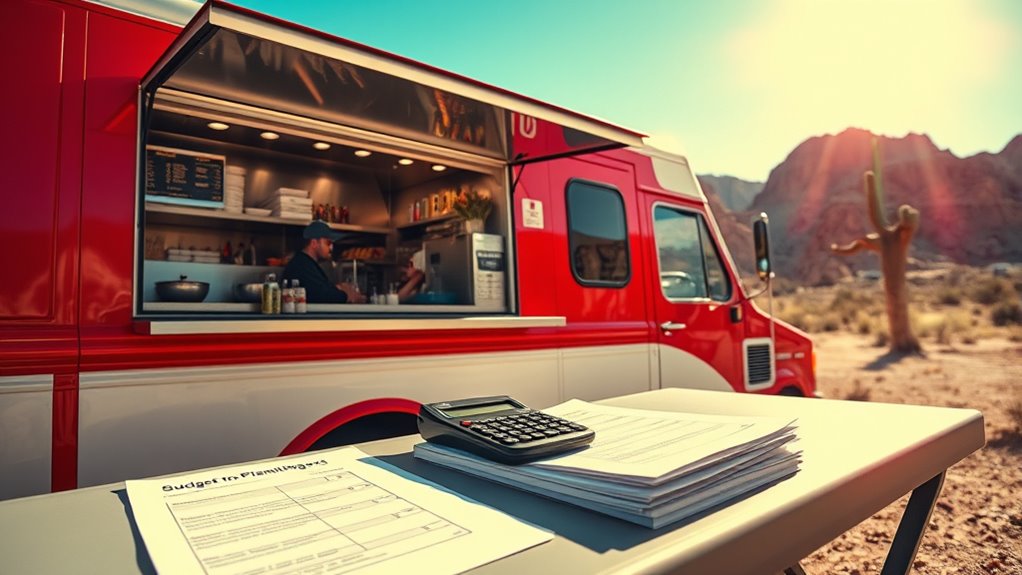
To get your food truck off the ground, you’ll need to plan for initial vehicle costs and understand financing options like SBA loans. Budgeting for liability insurance is also essential to protect your business and meet legal requirements. By carefully considering these expenses, you can set a solid financial foundation for your food truck venture.
Initial Vehicle Purchase Costs
Buying your food truck is a significant upfront investment that requires careful budgeting. The initial vehicle purchase cost varies based on size, condition, and whether you buy new or used. To guarantee smooth operations, consider factors like vehicle maintenance and fuel efficiency, which influence ongoing expenses. Here are four key points to keep in mind:
- Initial Cost: New trucks typically cost $70,000–$150,000, while used vehicles can be $20,000–$80,000.
- Vehicle Condition: Prioritize trucks in good condition to reduce future repair costs.
- Fuel Efficiency: Opt for models with better fuel economy to lower operating costs.
- Additional Expenses: Budget for modifications and equipment needed for your food service.
Understanding these costs helps you plan your budget and avoid surprises down the road.
Small Business Administration Loans
Are you wondering how to finance your food truck without draining your savings? Small Business Administration (SBA) loans can be a great option. These loans often offer favorable terms, making it easier to cover vehicle costs, licenses, and equipment while maintaining your budget. Plus, SBA loans can help assure you meet food safety and licensing compliance standards without financial stress.
Here’s a quick overview:
| Benefits of SBA Loans | Things to think about |
|---|---|
| Low interest rates | Approval process may take time |
| Longer repayment terms | Requires solid business plan |
| Accessible for new businesses | Need to demonstrate capacity |
Using SBA loans helps you get started confidently while prioritizing licensing compliance and food safety.
Liability Insurance Requirements
Liability insurance is a vital expense to contemplate when budgeting and financing your food truck, as it protects you from potential legal and financial risks. Having proper liability coverage ensures you’re protected if someone gets injured or if your truck causes property damage. When choosing insurance policies, consider the level of coverage needed to meet local regulations and your specific risks.
Here are four key points to keep in mind:
- Verify state and city requirements for liability coverage.
- Shop around for policies that fit your budget and needs.
- Ensure your insurance policy covers food-related incidents.
- Regularly review and update your coverage as your business grows.
Having the right insurance policies in place helps you operate confidently and minimizes the risk of costly legal issues.
Designing Your Menu and Pricing Strategy
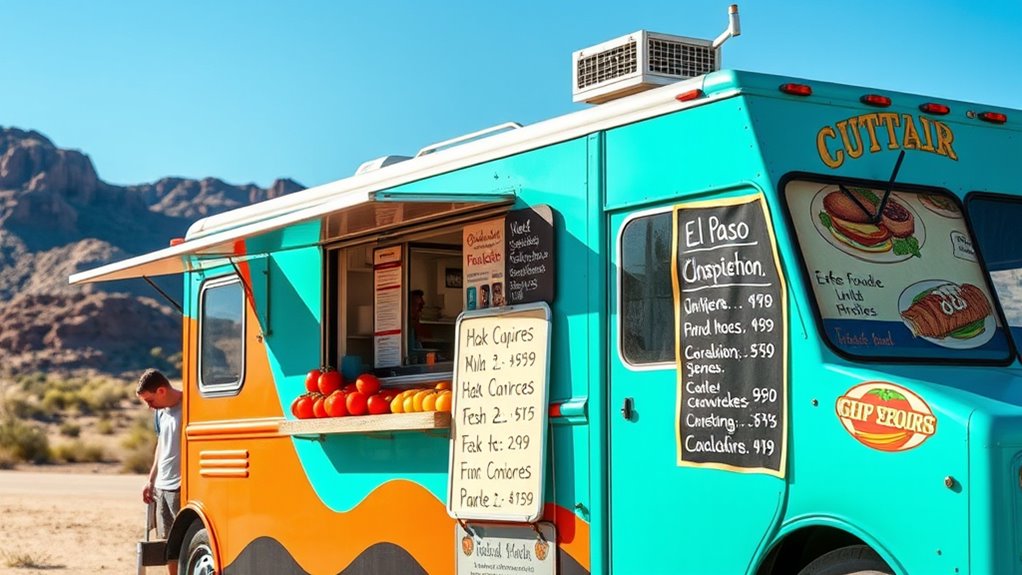
When designing your menu, focus on creating locally inspired flavor combinations that resonate with El Paso’s vibrant culture. To set competitive prices, carefully calculate ingredient costs using reliable methods that guarantee profitability. Balancing unique flavors with smart pricing will help attract customers and grow your food truck business. Incorporating popular regional ingredients and best practices in pricing strategies can further enhance your success.
Locally Inspired Flavor Combinations
To craft a menu that truly resonates with the El Paso community, focus on blending local flavors into your dishes. Embrace flavor fusion and ingredient innovation to create unique offerings. Incorporate regional ingredients like hatch chiles, carne asada, or queso fresco to stand out. Experiment with combining traditional elements in new ways to excite your customers. Here are some ideas to inspire your menu:
- Hatch chile queso burgers with a spicy kick
- Carne asada tacos topped with pickled jalapeños
- Breakfast burritos featuring chorizo and roasted peppers
- Churro waffle bites dusted with cinnamon sugar
Ingredient Cost Calculation Methods
Understanding the true cost of your ingredients is essential for pricing your food truck menu effectively. To do this, you need accurate ingredient cost calculation methods that break down every item’s expense. Start by tracking the cost of each ingredient used in your recipes, including waste and portion sizes. Then, divide the total ingredient costs by the number of servings to determine a per-serving cost. This method helps you identify how much each dish costs to make, enabling you to set profitable prices. Consistently updating your cost calculation guarantees your pricing stays competitive and profitable, especially as ingredient prices fluctuate. By mastering these ingredient cost calculation methods, you’ll confidently set menu prices that cover expenses while attracting customers.
Technology and Operations
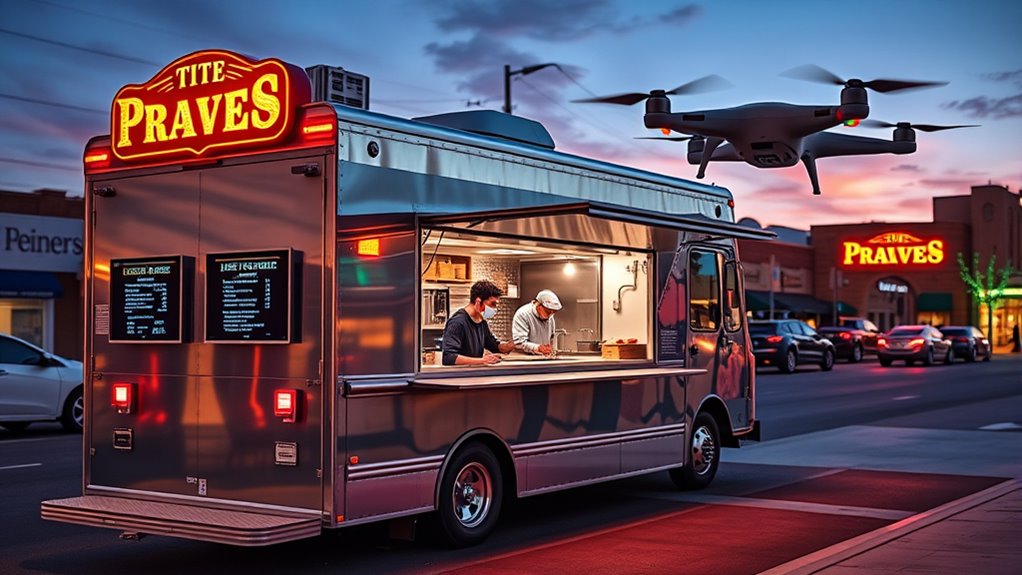
Using wireless card readers and apps can streamline your payment process, making transactions faster and more secure. Mobile POS systems allow you to manage orders and inventory on the go, keeping your operations efficient. Incorporating these technologies helps you stay competitive and delivers a better experience for your customers. Understanding dream symbols can also help you interpret customer feedback or your own experiences, providing deeper insights into your business environment.
Wireless Card Readers and Apps
Wireless card readers and apps have transformed how food trucks process transactions, making payments faster and more secure. With wireless payment options, you can accept cards and mobile payments on the spot, reducing wait times. Plus, mobile ordering integration allows customers to place orders ahead, streamlining service. These tools simplify operations and improve customer satisfaction. Here are four key benefits:
- Quick transactions with wireless payment technology
- Reduced cash handling and risks
- Enhanced security with encryption
- Seamless integration with mobile ordering apps
Mobile POS Systems
Mobile POS systems build on the convenience of wireless payment technology by providing an extensive solution for managing sales and inventory directly from your truck. With a mobile POS, you can process transactions quickly, keeping lines moving and customers satisfied. Payment security is a top priority; these systems use encryption and secure connections to protect sensitive data, giving both you and your customers peace of mind. Transaction speed improves markedly, allowing for seamless payments with credit cards, mobile wallets, or contactless options. You’ll also gain real-time sales insights and inventory updates, simplifying daily operations. By investing in a reliable mobile POS, you streamline your workflow, enhance customer experience, and ensure that your payment process is both fast and secure.
Marketing and Growing Your Presence
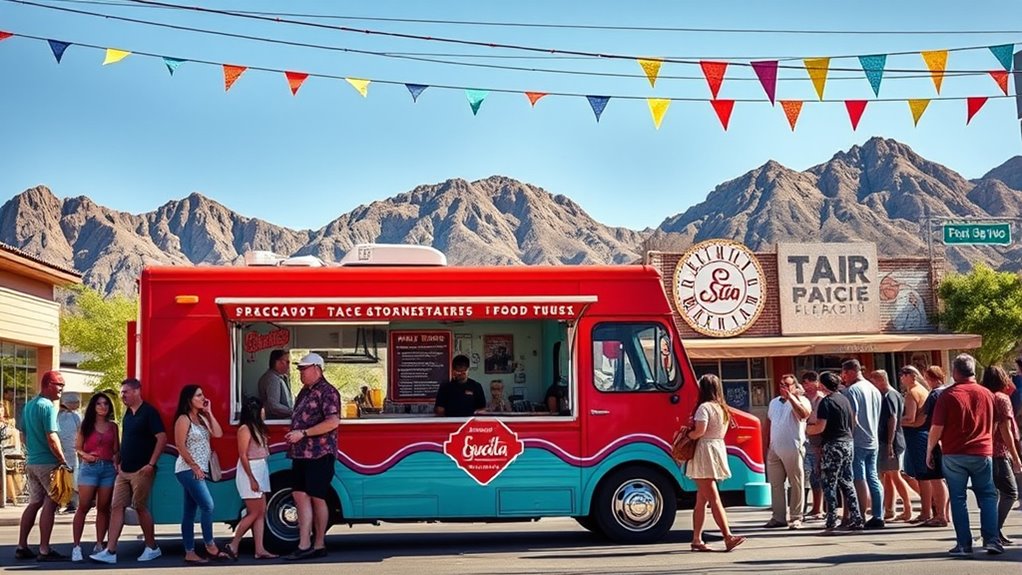
To grow your food truck’s presence, focus on scheduling your peak customer times so you’re ready when demand is highest. Use Instagram Stories to engage your audience daily, sharing behind-the-scenes moments and special offers. This approach helps you build a loyal following and attract new customers consistently. Additionally, leveraging analytics and reporting from time management apps can help you analyze your busiest hours and optimize your schedule accordingly.
Scheduling Peak Customer Times
Understanding when your customers are most likely to visit is key to maximizing your food truck’s sales. By scheduling during peak hours, you can better manage customer flow and boost revenue. To identify these times, monitor foot traffic and sales data regularly. Once you notice patterns, plan your busiest hours accordingly. Here are some ideas to optimize your schedule:
- Track daily customer flow to pinpoint high-traffic times
- Adjust your operating hours to align with peak hours
- Offer promotions during slow periods to attract more customers
- Collaborate with local events to increase visibility during busy times
Leveraging Instagram Stories Engagement
Instagram Stories offer a dynamic way to engage your audience and boost your food truck’s visibility. Use this feature to showcase daily specials, behind-the-scenes moments, or customer testimonials. Incorporate engagement strategies like polls, Q&A sessions, and countdowns to encourage interaction. These tools help build a loyal following and generate buzz around your truck. To illustrate, here’s a quick guide:
| Engagement Strategy | Example | Goal |
|---|---|---|
| Polls | Best taco flavor? | Gather feedback |
| Q&A | Ask about menu? | Increase interaction |
| Countdown | New location launch | Build anticipation |
| Swipe-Up Links | Special offer | Drive traffic |
Consistent use of Instagram Stories will keep your El Paso audience engaged and enthusiastic to see what’s next!
Local Events Boost Sales
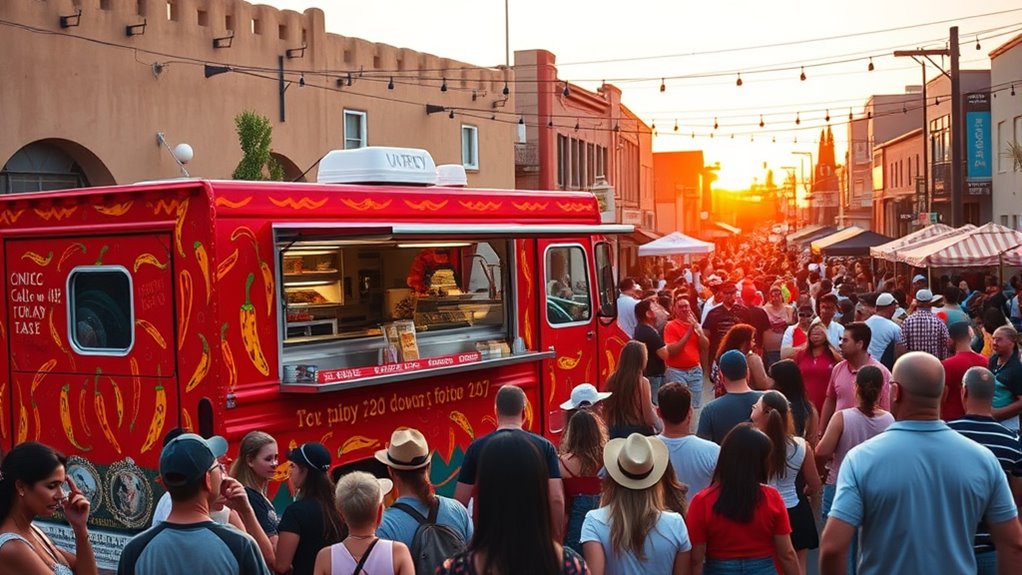
Local events in El Paso have proven to be a significant driver for food truck sales, drawing large crowds enthusiastic to enjoy diverse culinary options. Participating in local food festivals and building community partnerships can boost your visibility and sales. These events attract both locals and tourists eager to sample new flavors, creating excellent opportunities for exposure. To maximize your success:
- Partner with event organizers to secure a prime spot.
- Offer exclusive festival menu items to entice attendees.
- Collaborate with local businesses to cross-promote.
- Engage with the community through social media before and during events.
Frequently Asked Questions
What Permits Are Required for Food Trucks in El Paso?
To operate a food truck in El Paso, you need to obtain specific permits. You must secure a food truck permit from the El Paso health department and a mobile food vendor permit following El Paso regulations. Additionally, you may need a city business license and parking permits. Make sure to verify with local authorities to guarantee you meet all requirements before hitting the streets.
How Can I Find Reliable Food Truck Suppliers Locally?
To find reliable food truck suppliers locally, start by researching online directories and visiting local markets in El Paso. Attend food truck events to network and gather recommendations. Focus on food truck marketing by asking suppliers about quality and pricing, and don’t hesitate to negotiate to get the best deal. Building good relationships with local suppliers guarantees consistent quality and dependable service for your food truck business.
Are There Specific Health Codes Unique to El Paso?
Think of El Paso’s health codes like a well-worn map guiding your food truck journey. You must follow local health inspections and food safety standards, which are tailored to keep your customers safe and healthy. While no unique rules set El Paso apart, you’ll need to make certain of proper food handling, sanitation, and licensing. Stay vigilant, follow the guidelines, and your truck will thrive in this vibrant culinary landscape.
What Are the Best Locations to Park My Food Truck?
You should focus on high-traffic areas like downtown El Paso, university campuses, and busy shopping centers. Use parking strategies that position your food truck near popular events or markets, maximizing customer foot traffic. Consider rotating locations based on peak hours and community events to attract more customers. By scouting busy spots and timing your presence well, you’ll increase visibility and sales, making your food truck a go-to for locals and visitors alike.
How Do I Handle Local Taxes and Licensing Compliance?
You need to stay on top of local taxes and licensing compliance by regularly filing your tax returns and keeping track of licensing renewals. Visit the El Paso city or county website to understand specific requirements, and consider working with a local accountant familiar with food truck regulations. This way, you avoid fines and guarantee your business stays legal and compliant with all tax filing and licensing obligations.
Conclusion
Now that you have the essentials, the real challenge begins. Will your food truck stand out among El Paso’s vibrant scene? With the right mix of flavor, strategy, and timing, you could turn your passion into a thriving business. But remember, every successful journey has its surprises. Are you ready to take the leap and discover what’s next? The streets of El Paso are waiting—your move could change everything.
